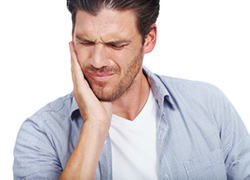Jaw Pain Can Lead to Ear Issues
Posted on 10/15/2025 by Lakewood Dental Arts |
 Have you been experiencing jaw pain lately? It might not seem like a big deal, but jaw pain can actually lead to ear issues. In this article, we'll explore the connection between jaw pain and ear problems, and what you can do to find relief. Have you been experiencing jaw pain lately? It might not seem like a big deal, but jaw pain can actually lead to ear issues. In this article, we'll explore the connection between jaw pain and ear problems, and what you can do to find relief.
The Connection Between Jaw Pain and Ear Issues
The temporomandibular joint (TMJ) connects your jawbone to your skull. This joint allows you to open and close your mouth, chew, and speak. When the TMJ is healthy, it functions smoothly and painlessly. But when something goes wrong with the TMJ, it can cause pain in your jaw, face, and even your ears.
TMJ disorders are a common cause of jaw pain. These disorders can be caused by a variety of factors, including arthritis, jaw injury, teeth grinding, and stress. When the TMJ is not functioning properly, it can put pressure on the nearby nerves and muscles. This pressure can lead to pain, clicking, popping, and even difficulty opening and closing your mouth.
In some cases, TMJ disorders can also cause ear problems. The nerves that supply the TMJ are also responsible for sensation in the ears. So, when the TMJ is inflamed or irritated, it can send pain signals to the ears. This can cause earaches, tinnitus (ringing in the ears), and even dizziness.
What You Can Do About Jaw Pain and Ear Issues
If you are experiencing jaw pain and ear problems, it is important to see your dentist. They will be able to examine your mouth and TMJ to determine the cause of your pain. They may also recommend some treatment options, such as:
| • |
Oral care: Brushing and flossing your teeth regularly can help prevent TMJ disorders caused by poor oral hygiene. |
| • |
Restoration dentistry: If you have missing or damaged teeth, this can contribute to TMJ problems. Your dentist may recommend dental implants, bridges, or dentures to restore your teeth and bite. |
| • |
Mouth guards: If you grind your teeth at night, a mouth guard can help protect your TMJ and teeth from damage. |
| • |
Stress management: Stress can worsen TMJ symptoms. Learning relaxation techniques, such as deep breathing or yoga, can help reduce stress and improve your TMJ health. |
In some cases, medication may also be prescribed to relieve pain and inflammation.
Conclusion
Jaw pain can be a real nuisance, but it is important to remember that it can also be a sign of a more serious problem, like a TMJ disorder. If you are experiencing jaw pain, earaches, or other TMJ symptoms, see your dentist as soon as possible. With proper treatment, you can find relief and prevent further complications. |
|